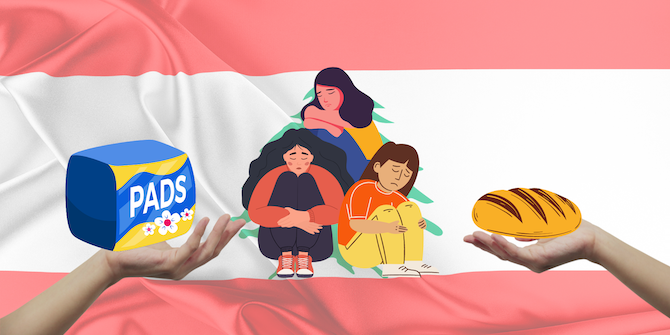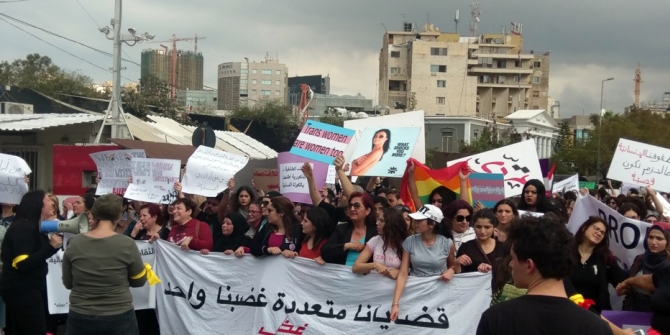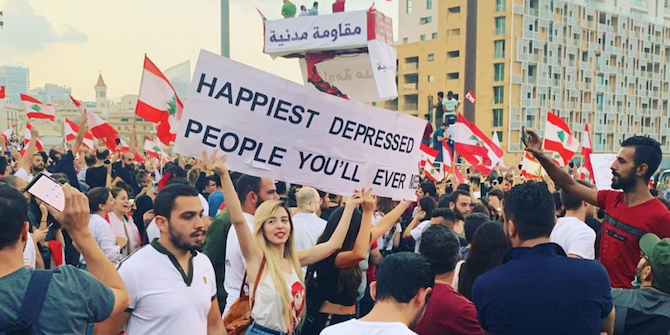by Ghiwa Nassereddine

Lebanon’s devastating economic crisis continues to spiral out of control, leading to increasingly dangerous conditions for the population. Since the start of 2022, the Lebanese lira has lost more than 15% of its value, worsening different types of poverty among vulnerable groups and communities including children, women, refugees, and families from low socio-economic backgrounds. Poverty has knocked on the doors of almost four million families since 2019, and 82% of the population now lives in multidimensional poverty – in terms of income, access to education, services, and health.
According to the local non-governmental organisation Fe-Male, more than half of women in Lebanon have been experiencing the effects of period poverty, as sanitary products have been subjected to a 500% increase in prices. 66% of adolescent girls have been unable to purchase the adequate quality and quantity of the menstrual products they need.
Period poverty is defined by the United Nations Population Fund (UNFPA) as ‘the struggle many low-income women and girls face while trying to afford menstrual products.’ It is also a result of the increased financial burden of purchasing menstrual supplies due to the higher economic vulnerability of women and girls.
Menstrual supplies are not limited to sanitary pads and tampons, but also include pain medication and hygienic material. Lack of supplies thus has a direct impact on girls’ and women’s health as their risk of infections increases drastically. Period poverty has also been shown to have extreme negative implications for access to education, with girls forced to stay at home and miss school due to a lack of menstrual supplies. It can also force girls to engage in dangerous activities such as child labour to secure the money needed to pay for their period services.
Dawrati, another NGO that aims to end period poverty in Lebanon, reports that replacements are being sought for period sanitary products, with women using tissue papers, nylon and cotton sheets, newspapers, and old cloth – some are even cutting their children’s diapers in two to serve as pads during their periods; all of which is extremely humiliating to women and extremely non-hygienic. Prices of menstrual products had already drastically increased ten times from $2 to $21 between 2019 and 2021.
Lebanese decision-makers have long been failing to promote women’s rights and well-being, where for example, a cabinet meeting for selecting 300 items that need to be subsidised back in 2020 was composed of seven men who concluded that razors were much more important than any type of sanitary pad during a time where period poverty had been worsening. It is worth noting that over the past ten years access to safe period management practices for Syrian refugee women has been extremely limited, given they live in areas lacking clean water and private spaces needed to change their pads or wash soiled clothes.
Alternative solutions have been proposed by charitable enterprises, local NGOs and businesses to combat period poverty by promoting the use of eco-friendly products like reusable pads, increasingly a need rather than an option. Reusable pads are composed of a fabric that needs to be washed after every use and can last for almost 5 years, which is hence a cost-effective decision as women could save up to 60-76% every year. However, the initial investment for reusable pads remains a disincentive, equivalent to approximately two packs of seven disposable pads. Additionally, other challenges such as social acceptance and availability of resources to regularly wash the fabric pads prevents them from acting as a panacea to address the period poverty crisis. Online businesses like Juniper promote the use of reusable menstrual cups, but these have also been criticised as expensive, socially unacceptable and intolerable by the women who are using and/or considering using them.
Securing the funds necessary to distribute period products and secure their access and availability is insufficient without also investing in proper education and a wider discussion to tackle period poverty. Stigma and taboos around menstruation should be addressed, and long-term solutions to period poverty need to be discussed and implemented through community-based awareness-raising sessions, festivals, and workshops. Jeyetna, a two-month period poverty festival that was successfully adopted within a local context, took place in 2021 and distributed reusable pads, conducted information sessions, and provided medical consultations to girls and women in the area. Such education and awareness sessions can address the misconceptions and increase the motivation of women into using different affordable alternative products.
The economic situation shows no signs of improvement, so immediate and long-term action needs to be taken against period poverty in Lebanon. Many organisations and individuals have been working together to support women in this battle, however, female voices at decision-making tables are now acutely necessary to fight for women’s rights and ensure their better well-being as the country continues to face existential threats.







Hello Ghiwa
I volunteer for an NGO in Edinburgh which sends aid (clothes, shoes etc) directly to the refugee camp in Arsal in the Lebanon. We have started making reusable pads and wish them to go to Arsal. We need to break down the barriers of ignorance and fear before they can be accepted.
I would appreciate your advice on steps we can take to help this project come to fruition. I wonder what help you can give us.
Kind regards,
Kay (Ross)